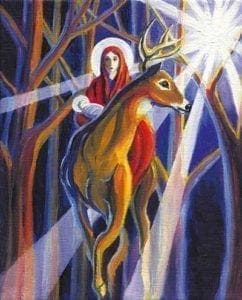In the mysterious heart of Christmas
By LORRAINE V. MURRAY | Published January 4, 2025
“Let us lift up our hearts,” the priest prays. This is a moving moment in the liturgy, when we respond: “We lift them up to the Lord.” I envision my heart in upraised hands, surrendering myself to the Lord Jesus Christ.
Isn’t this the sacred core of human life? We give our hearts to God, who has given his heart to us. Jesus talks so much about hearts, and tells us in Revelation: “Behold, I stand at the door and knock.” The door is the entry into our deepest being.
As babies, our hearts are pure and open and delicate. We have no prejudices, regrets, fears or grudges. As we age, unfortunately, we start walling off different parts of our hearts. We keep secrets in some parts and wounds in others. We are careful with whom we share the secrets and the wounds.
 Jesus warned against hardening our hearts against God. He was talking about people who have lost the ability to trust openly like a little child. The people who cross their fingers instead of praying. Who scoff at his admiration for meekness and humility. He knew about people who have ears but do not hear, and eyes but cannot see.
Jesus warned against hardening our hearts against God. He was talking about people who have lost the ability to trust openly like a little child. The people who cross their fingers instead of praying. Who scoff at his admiration for meekness and humility. He knew about people who have ears but do not hear, and eyes but cannot see.
At Christmas, perhaps they can’t hear the sound of angels singing. They can’t hear the intake of breath of the shepherds, as they gaze upon the wondrous baby. They can’t hear the joy in Mary’s voice, as she cradles him close to her.
At Christmas, some of us cannot see what is right before our eyes. We look into the creche and don’t realize what we see there is real. A baby really was born in that stable, and God really did humble himself to become a human being. We hear the words at Mass: “By the mystery of this water and wine, may we come to share in the divinity of Christ, who humbled himself to share in our humanity.”
We are all part of the Christmas story. We are the young girl who is given a startling message by an angel. Her heart is big enough and tender enough to say “yes” to God.
We are also Joseph, who has to rely on dreams and what Mary tells him. He knows the facts of life, which dictate that virgins don’t get pregnant. It is his amazing love for her that prevents him from shunning her. His love isn’t rational, but what love is?
We are the shepherds, watching our flocks in the fields. We are weary and cold, and we are poor. But somehow God thinks we are important enough to be the recipients of a life-changing message. And so we trust and we obey, and we follow the star until we find the child.
We are the animals, so patiently standing in the stable. How they are mistreated, time and again. The donkey and the ox are beasts of burden, so when they are weary and hungry, they must succumb to the master’s demands. And the lamb! This is the gentle and sweet animal slaughtered for temple sacrifices. An animal that meets the grim edge of a knife and spills its blood upon the ground.
We are also the baby, lying upon the sweet hay, helpless, trusting and completely dependent on parents to protect him. We have the mysterious heart of pure innocence, pure trust and pure love. We bring light into a dark world.
Still, how heavy our hearts become as we age. They are crowded with memories, some lovely and some lonely. They have walls to protect us from harsh words and unkind actions. Our hearts have scars from our losses. They have been thrown to the ground and shattered, and then pieced together like a clay pot.
This is the heart that I lift up to the Lord each week at liturgy. It is scarred and it is scared, and it is lonely, but still loving. It is far removed from the heart of the innocent baby who comes at Christmas. I wish it were more beautiful, purer and more open. But it is the only heart I have, and the miraculous thing is that, despite its many flaws, he accepts it in the fullness of love.